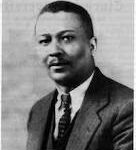 Francis Cecil Sumner is known as the “Father of Black Psychology.” He was the first African American to receive a Ph.D. in psychology in 1920. Sumner worked closely with another well know psychologist, G. Stanley Hall, while at Clark University. Sumner was self-educated after elementary years, and he went on to college at age 15 and graduated as valedictorian of his class. Sumner studied in multiple disciplines throughout his educational career such as philosophy, English, modern languages, Greek, Latin, and psychology. Sumner was drafted during World War 1 and had to put his doctoral pursuit on hold. Following his discharge, Sumner completed his dissertation entitled “Psychoanalysis of Freud and Adler.”
Francis Cecil Sumner is known as the “Father of Black Psychology.” He was the first African American to receive a Ph.D. in psychology in 1920. Sumner worked closely with another well know psychologist, G. Stanley Hall, while at Clark University. Sumner was self-educated after elementary years, and he went on to college at age 15 and graduated as valedictorian of his class. Sumner studied in multiple disciplines throughout his educational career such as philosophy, English, modern languages, Greek, Latin, and psychology. Sumner was drafted during World War 1 and had to put his doctoral pursuit on hold. Following his discharge, Sumner completed his dissertation entitled “Psychoanalysis of Freud and Adler.”
Sumner’s main focus in psychology is “race psychology” wherein he studies how to understand and eliminate racial bias in the administration of justice. He wanted to combat the Eurocentric methods of psychology that were used during his time. Sumner critiqued the way the education system treated African Americans. His views aligned with Booker T. Washington and W.E.B. Dubois. Sumner believed that the department of psychology should separate from philosophy and the school of education within the university system. Throughout his time as a professor, Sumner constantly struggled to receive funding, and he believed that this struggle was due to racial discrimination. Aside from “race psychology,” Sumner also studied color and vision, as well as the psychology of religion. Sumner submitted a paper to the International Congress of Religious Psychology entitled “The Mental Hygiene of Religion.” He was one of the first people in academia to contribute to the fields of psychology, religion, and the administration of justice together. In Sumner’s later years he worked with the Journal of Social Psychology and the Psychological Bulletin. He wrote abstracts, primarily for studies written by French, German, Russian, Spanish, and English authors. Sumner was described by his students as being motivating and encouraging.
http://www.apa.org/pi/oema/resources/ethnicity-health/psychologists/sumner-prosser.aspx